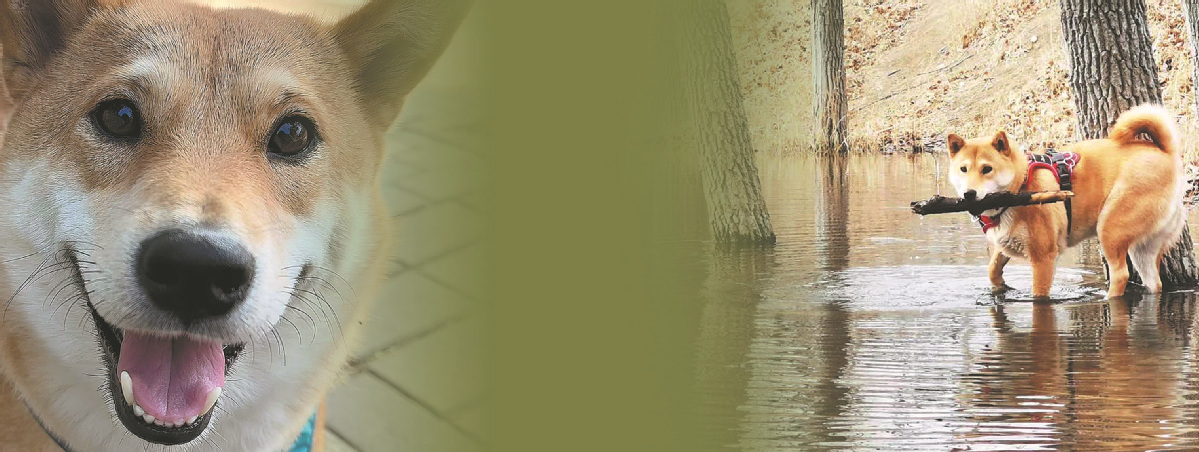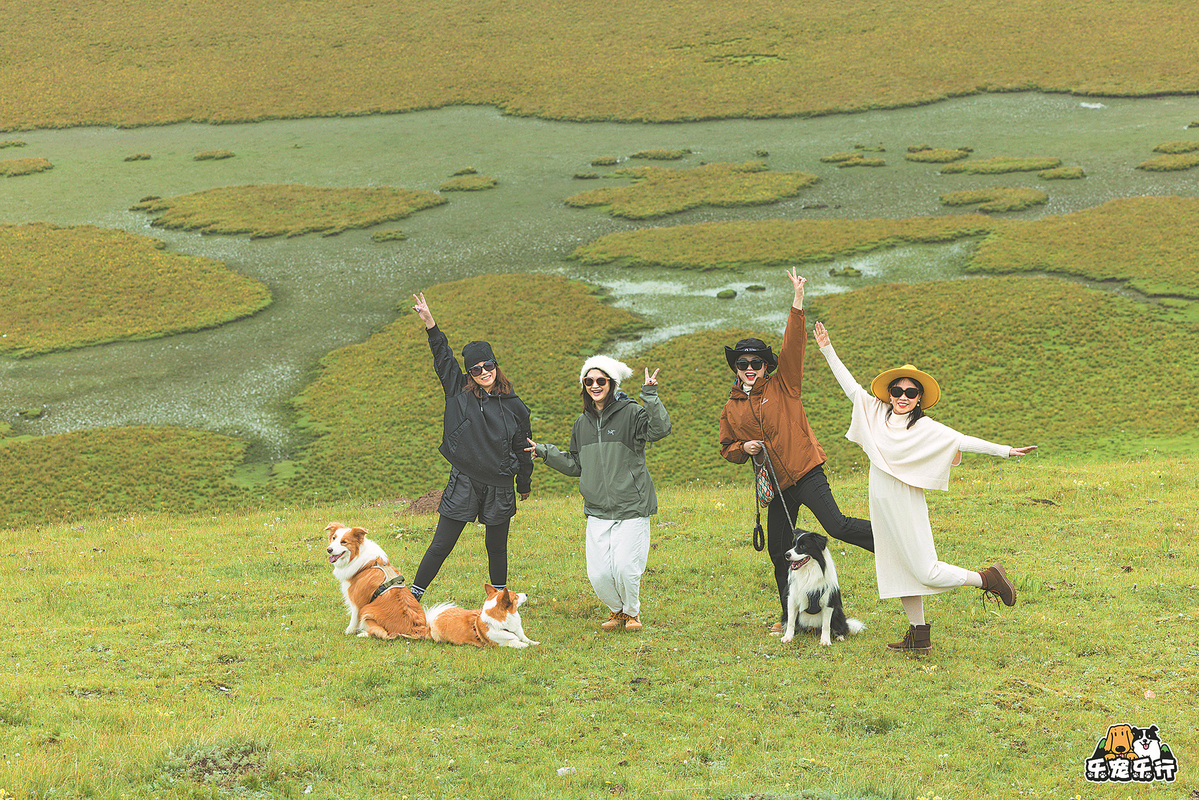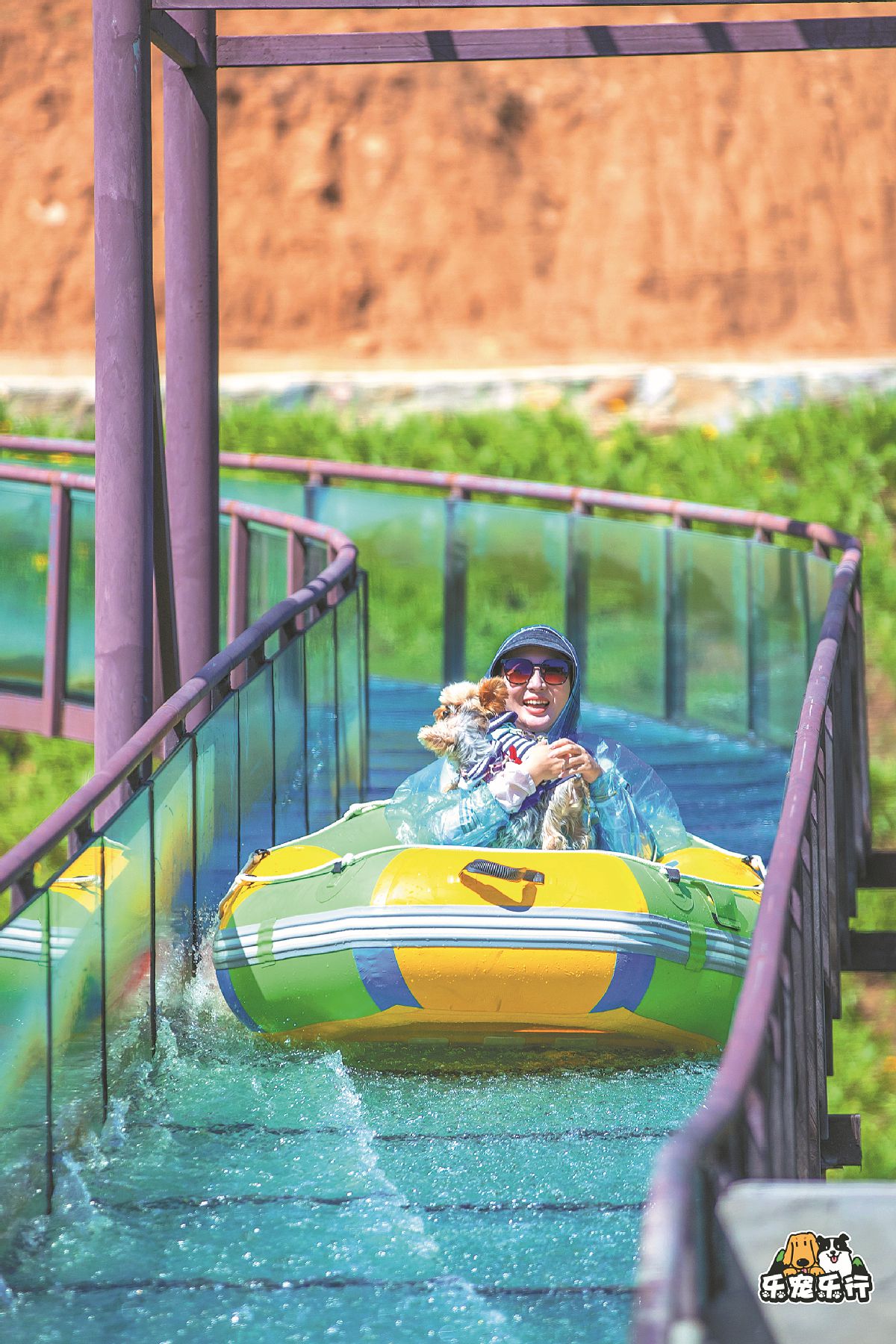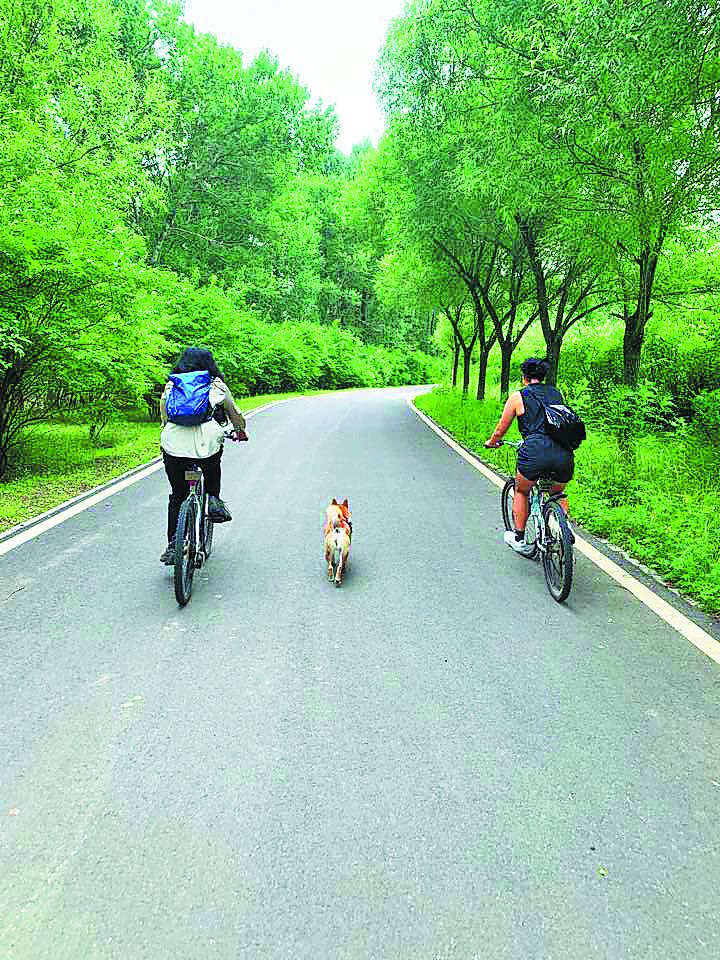Pets take to the roads and air with their owners

A shiba, or Japanese mountain dog, enjoys playing on the upper reaches of the Yongding River in Huailai, Hebei province. WANG AIPING/FOR CHINA DAILY
Fast-developing niche travel market offers plenty of potential
More pet owners are taking their animals on travels, with related services such as specialized tours, accommodations and medical care now available.
Owners said it is good for the pets to see more of the outside world, as this broadens their experience of life.
For example, owners are accompanying their animals on Ferris wheels, cable cars, in kayaks and on paddle boards. They also take them to view the sea, on camping trips, and to visit grassland areas.
By immersing themselves in the wild and interacting with other animals, pets, who live urban lives most of the time, get up close with nature. Some owners said that taking their pets on trips helps avoid the guilt of having to leave them at home when they go traveling.
Pet-friendly hotels, charter flights and package tours are among the many personalized services now available — proof that demand is strong and there is plenty of potential in this niche business sector. Chinese society also appears to have become more inclusive and tolerant in dealing with animals.
In May, Bonnie Yao, 28, from Shenzhen, Guangdong province, traveled across western China for 50 days with her border collie Nian Nian after being laid off and wanting to spend time exploring wilderness areas.
"I think taking pets on trips is a good idea, because they belong to nature. In particular, dogs that live in cities for a long time may experience stress or depression because their working abilities and skills are not fully used. Taking them out to play frequently can give them an opportunity to express themselves," Yao said.
She added that Nian Nian "herded" several lambs on grassland in Ganzi Tibetan autonomous prefecture, Sichuan province.
"Nian Nian was very curious about the lambs. After ensuring that he wouldn't harm them, I let him play with them for a while. He ran around, constantly keeping an eye on them," she said.
Yao added that during the trip, she further appreciated the beauty of nature. "We saw the most beautiful sunset at the summit of a snow mountain. At that moment, I felt as though I had arrived at the end of the world," she said.
Cai Yi, 24, an event planner in Nanjing, Jiangsu province, has taken her beagle Pu Pu on every trip she has made since owning her in 2021.
"At first, I thought she was obedient, but I subsequently found that she is too crazy. If she does not use up all her energy, she will destroy my home. So, to prevent the house becoming a mess when I'm out, I've taken her on trips," Cai said.
She added that the cost of boarding a pet in Nanjing is too high, at about 50-80 yuan ($6.80-$10.90) per day, and about 100 yuan a day during holidays.
Cai has taken Pu Pu to Anji and Hangzhou in Zhejiang province, the coastal city of Qingdao, Shandong province, and to Shanghai. She mainly uses ride-hailing services, as she cannot drive.
She said some drivers who like dogs allow Pu Pu out of her pet carrier. "They also ask if I want to stop and let the dog answer a call of nature and get some fresh air. They are very friendly to dogs," she added.
Pu Pu generally adapts well to new environments, because beagles are relatively fearless and curious about most things, Cai said.
"The first time my dog went to the beach, she was scared of the waves and barked at the sea, but after a few waves crashed against her, she was fine. Later, she even wanted to run into the waves," Cai said.
"When we went to Qingdao, I dressed Pu Pu up nicely, and many tourists came over and took photos with her. These are beautiful memories."
Cai said Pu Pu usually behaves well, apart from a tendency to randomly answer the call of nature.
"When we went to Pet Fair Asia in Shanghai, she pooped at the security checkpoint, which was embarrassing. I have to take paper with me everywhere we go to avoid causing trouble for others," she said.
Cai added that apart from a pet carrier, she prepares little for Pu Pu. If the dog is hungry, Cai finds some boiled pork for her at a hotel.

Pet owners and their animals have fun on a trip organized by Lechonglexing, a dogs' travel platform based in Beijing. [Photo provided to China Daily]
Good companions
Men Zhou, 24, a pets' e-commerce worker in Foshan, Guangdong province, said her golden retriever Mao Mao has made traveling much more fun.
"Mao Mao sheds hair in the car, but while we listen to music, he listens to us talking. Life on the highway can be slow and relaxing at times. We rented an electric scooter, sitting him up front. When we stopped at traffic lights, he liked to lick the people waiting at them alongside us. It was quite adorable," Zhou said.
She and her husband once left the dog at home for a day or so. Whenever they checked on him through a surveillance camera, Mao Mao seemed lethargic and uninterested in eating or sleeping.
"He just waited for us to come back, which made us feel sorry for him, so we decided to start taking him with us whenever we went out," Zhou said, adding that they have traveled for a total distance of 5,000 kilometers with the dog in the car.
The couple bought probiotics and hemostatic powder to prevent Mao Mao experiencing stomach discomfort, loss of appetite due to environmental changes, or injuries from bumps in the road. They also packed essential daily items such as dog food, snacks, toys, collapsible bowls, water bowls, towels and shower gel in the car. And, of course, poop bags.
Zhou said they avoided peak travel periods and popular tourist attractions, opting instead for open areas. When booking hotels, they carefully chose those that explicitly allow pets. They also called in advance, as some hotels may charge additional cleaning fees for pets.
"It's not good for dogs to travel in extremely hot weather or rain, and Mao Mao doesn't like wearing a rainproof jacket. But despite these inconveniences, I know he enjoys traveling," Zhou added.
Tracy Bai, 29, who works in the games industry in Chengdu, Sichuan province, owns a 14-year-old border collie Yumi, a Siberian husky Winky, a snowshoe cat Kuang Kuang, and a 1-year-old Ragdoll cat. She wants to take her pets to every place she visits.
Bai and her husband take the two dogs whenever they toured, but only take the cats to less populated and quiet places, as cats are particularly sensitive to their environment.
The couple have many heartwarming memories — for example, accompanying Yumi to watch fireworks, and seeing the cats and dogs playing together in the rain.
"Besides food, other supplies and toys, we take specific items depending on the requirements for the trip, such as life jackets for playing in the water, and goggles and snow boots for the snow. I also take insect repellent, combs and ionized water for grooming. In addition, for the cats, I bring litter boxes, carriers and beds. It's no surprise that everyone says it's more troublesome to take a cat on a trip," Bai said.
"Taking pets traveling requires thorough preparation, such as making an itinerary and packing emergency supplies for unexpected situations. It's also important to behave responsibly during a visit to encourage the growth of pet-friendly accommodations."

Pet owners and their animals have fun on a trip organized by Lechonglexing, a dogs' travel platform based in Beijing. [Photo provided to China Daily]
Package tours
As there are restrictions on traveling with pets on buses, subways, trains and airplanes, most owners travel with their animals by car. However, some choose specialized package tours.
Zhang Shaopeng, founder of Lechonglexing, a dogs' travel platform based in Beijing that was established in 2018, said the company's trips include visits to grasslands, beaches, mountains, wetlands and lakes. Private bookings are also available for dogs to visit aquariums and amusement parks.
Trips range from one or two days for nearby attractions, to three days or more for visits to destinations such as Gannan Tibetan autonomous prefecture, Gansu province, Hulunbuir, Inner Mongolia autonomous region, and Sanya, Hainan province.
For destinations relatively close to Beijing, the company arranges buses, with a 50-seater vehicle usually only carrying about 15 passengers to give dogs more room for exercise and avoid poor air quality.
For remote destinations, chartered flights for pets are available, with dogs placed in pet carriers inside the aircraft cabin with their owners.
Before they travel, the company inquires about the dogs' personalities and health status. For example, dogs in heat and those that are aggressive are not allowed to go on a tour, to ensure the safety of other dogs, and those with heart problems are not allowed to go to high-altitude areas. A doctor accompanies the dogs throughout a trip.

Cyclists take a shiba on a trip in suburban Beijing. [Photo provided to China Daily]
The company usually books an entire floor of rooms to avoid the dogs' barking disturbing guests.
"I once stayed in a guesthouse where the receptionist prepared welcoming gifts for dogs, which included toys and glow collars to reduce the chance of an animal getting lost at night," Zhang said.
During check-in, the hotel floor and type of room assigned to an owner is based on a dog's size, with large animals housed in bigger rooms and on lower floors. Dog bowls, mats, towels specifically for the animals, and disinfectant sprays are placed in the rooms, Zhang added.
The company organizes about 15 trips a month, compared with only two or three in 2018. Customers using its services are generally those born between 1985 and 1995.
"I have seen pet travel gradually being accepted by society. In 2015, when I entered the industry, pet travel was a complete blank, with few hotels willing to accommodate animals," Zhang said, adding that there are now also more reliable pet travel organizations.
Queenie Fu, 35, a catering manager in Beijing, and her corgis Kele and Qixi joined one of the company's tours to a grassland area in Inner Mongolia and also took a short trip to the Miyun Reservoir in suburban Beijing. She said the dogs made friends with other dogs, and pet owners also enjoyed social activities.
The most memorable moments for Fu included playing with the dogs on paddle boards and when Qixi tilted her tongue and twitched her legs to pretend she was exhausted after climbing a mountain.

Winky, a Siberian husky, and Yumi, a 14-year-old border collie, explore grassland beside Yele Lake in Sichuan province. [Photo provided to China Daily]
New services
With improved living standards, more families are raising pets, who now number more than 100 million in China. As love for their animals deepens, a rising number of owners are looking to travel with them.
Wang Jinwei, an associate professor at Beijing International Studies University's School of Tourism Sciences, said more Chinese now regard pets as part of the family, so it's only natural to take them on travels.
As more companies sense the business opportunities in this market, related tourism products and services are fast becoming available, such as pet-friendly hotels and scenic spots, Wang added.
"Pets also bring happiness and comfort to humans, while travel relieves people from work stress. Combining the two meets people's psychological demands for a leisurely life," he said.
However, there are still only a limited number of facilities especially for pets, such as cabins, seats and hotels. There is also a lack of related laws and regulations about pets' health, sanitation, accidents and possible infectious diseases, Wang added.
In view of this, more innovative products for pets, such as special beds, travel insurance and medical care can be expected in the future to ensure that owners and their animals are properly cared for during trips, he said.
Kathy Jiang, principal at consultancy Roland Berger, said most people traveling with pets are from the medium- and high-end income groups, who have greater demands for their travel experience.
She suggested that hotels and attractions gradually increase their services, such as providing rooms for pets and making special tableware available. There should also be improved promotion to raise public awareness of such services, and increased investment in pet travel companies, Jiang said.
"Pet travel is developing into a new market with great potential. It is also driving development of emerging sectors such as pet hotels and tourism service providers," she added.
Photos
Related Stories
Copyright © 2023 People's Daily Online. All Rights Reserved.









